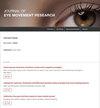眼动追踪在吸烟中的应用:当前方向和未来展望
IF 2.8
4区 心理学
Q3 OPHTHALMOLOGY
引用次数: 2
摘要
多年来,人们普遍意识到吸烟带来的健康成本,这促使科学家们将眼球运动的测量方法应用于这种形式的成瘾。一方面,他们调查了吸烟者是否会优先观看与吸烟有关的场景和物品。与此同时,另一方面,眼动追踪已被用于测试吸烟者和非吸烟者如何与政策制定者在烟草广告和包装上强制要求的不同类型的健康警告互动。在这里,我们概述了不同研究方向的主要发现,例如与吸烟者对吸烟提示的注意偏差有关的证据,以及图形警告标签和普通包装可显着增加警告标签的显著性的证据。我们指出了一些悬而未决的问题,比如决定重度吸烟者是否表现出积极避免看图形警告标签的倾向的条件。最后,我们认为,应用于警告标签凝视探索的研究将受益于更广泛地使用更自然的测试条件(例如移动眼动追踪或虚拟现实),这些条件已被引入研究吸烟者在自由探索周围环境时对烟草相关物体的注意偏差。本文章由计算机程序翻译,如有差异,请以英文原文为准。
Eye tracking applied to tobacco smoking: current directions and future perspectives
Over the years the general awareness of the health costs associated with tobacco smoking has motivated scientists to apply the measurement of eye movements to this form of addiction. On one hand they have investigated whether smokers attend and look preferentially at smoking related scenes and objects. In parallel, on the other hand eye tracking has been used to test how smokers and nonsmokers interact with the different types of health warning that policymakers have mandated in tobacco advertisements and packages. Here we provide an overview of the main findings from the different lines of research, such as the evidence related to the attentional bias for smoking cues in smokers and the evidence that graphic warning labels and plain packages measurably increase the salience of the warning labels. We point to some open questions, such as the conditions that determine whether heavy smokers exhibit a tendency to actively avoid looking at graphic warning labels. Finally we argue that the research applied to gaze exploration of warning labels would benefit from a more widespread use of the more naturalistic testing conditions (e.g. mobile eye tracking or virtual reality) that have been introduced to study the smokers’ attentional bias for tobacco-related objects when freely exploring the surrounding environment.
求助全文
通过发布文献求助,成功后即可免费获取论文全文。
去求助
来源期刊

Journal of Eye Movement Research
OPHTHALMOLOGY-
CiteScore
2.90
自引率
33.30%
发文量
10
审稿时长
10 weeks
期刊介绍:
The Journal of Eye Movement Research is an open-access, peer-reviewed scientific periodical devoted to all aspects of oculomotor functioning including methodology of eye recording, neurophysiological and cognitive models, attention, reading, as well as applications in neurology, ergonomy, media research and other areas,
 求助内容:
求助内容: 应助结果提醒方式:
应助结果提醒方式:


